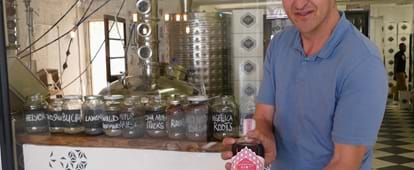By creating an account, I agree to the
Terms of service and Privacy policy
Choose your country and language:
Africa
Americas
Asia Pacific
Europe
GGin is the buzzword on everyone’s lips in Cape Town at the moment. It has literally taken the Cape by storm. What started off as a small group of entrepreneurs in the Western Cape testing the waters with small batch distillations of gin, has now grown into a highly-competitive industry. There are more than 50 registered gin distilleries in South Africa and approximately 30 of them are in the Western Cape. Yet still, new ones continue to emerge. This explosion of gin distilleries in the Western Cape can most certainly be attributed to the abundance of fynbos in the region - 9 300 species of this fine leafed plant are indigenous to the region and offer a wide variety of perfumed scents and medicinal properties.
Many of them pair well with the exotic yet essential ingredient for gin, the juniper berry. However, what few people know is that gin is so much more than a juniper berry-infused alcohol. The origins of gin have been traced back to the early 17th century in Holland, where it was sold as a medicine in pharmacies to treat indigestion, gout and gallstones. There are also claims that it was produced in Italy in the 11th century, although these have not been substantiated.
Nevertheless, despite the huge revival of gin throughout the world in the last decade and more recently in South Africa, it has not always enjoyed such notoriety among trendy socialites in the past. There was a period in 18th-century Britain where gin was a drink consumed largely by the poor.
It was only in the early 19th century, when far stricter legislation was put in place and the quality was dramatically improved, that gin consumption took its place among the higher echelons of society. This gave rise to the birth of gin palaces where members of high society gather and socialised. Thereafter gin remained a popular drink among certain sectors of society for almost two centuries, until it was rediscovered in the 21st century.
Now we’re confronted with a different dilemma each time we walk into our local bottle store, where one is faced with more than 100 various gins from all over the world to select from. Where does one even begin to look? One would not be mistaken for thinking that gin is fast catching up to the vast number of whiskeys available, and may even overtake them. Apart from the huge selection of gin currently available, there has also been a notable increase in the number of gin bars popping up in Cape Town and more recently Johannesburg.

PParticular bars worth visiting are the The Gin Bar in Wale Street, Cape Town and the Botanical Bar in Longmarket Street, Cape Town. Asara Wine Estate in Stellenbosch also boasts a broad selection of approximately 100 different gins and is well worth a visit if you are in the area. The Peninsula Hotel and 12 Apostles Hotel on the Atlantic Seaboard in Cape Town and the Royal Hotel in Riebeek Kasteel provide insightful experiences into the local gin industry with their huge selection. Their well-trained bar staff can serve up a classic martini that would impress James Bond.
In Durban, try the Gin Gallery Pop Up Bar in Florida Road Windermere, Distillery 031 and Bar in Berea, Secret Gin Bar (ever-changing pop-up venue) and Panorama Bar at Tsogo Sun’s Elangeni and Maharani.
In Joburg, head to Social on Main in Bryanston, Workshop 55 in Parktown, Tonic in Linden (small but worth a visit), 011 Dainfern in Sandton, The Countess in Melville, and the Union Bar Pop-Up.
Gin tasting is fast becoming a new urban outing, where groups of people, who would usually go wine tasting, now opt for a much closer and more involved experience. Within a few kilometres from Cape Town’s CBD are several gin distilleries that offer tasting experiences. These include Hope on Hopkins, Woodstock Gin Co, New Harbour Distillery, Pienaar and Son and Cape Town Gin and Spirits Company.
In Durban, there’s Distillery 031, and in Gauteng, try Time Anchor in Maboneng, Black Horse Distillery in the Cradle of Humankind and Silver Creek Distillery in Randfontein.
These experiences are interactive, informative and fun, and make for ideal stops for a bachelor or hens party, end-of-year office parties, birthdays or even a casual get together.

GGin, unlike many other food and drink trends before it, is a low-calorie drink that can be enjoyed by everyone at all times of the year. Given the huge selection of gins available on the market these days, there is a gin for every season and for every occasion.
So where to next for the gin industry, many may ask. It goes without saying that not all distilleries will survive the gin revival. Many of the pink, red and blue gins are trendy now, but might soon lose their appeal. However, gin is an age-old drink with the added benefit of containing medicinal properties. It has been around for many centuries and is likely to be around for many more. For all those wondering what is coming next after gin, well, it isn’t going anywhere, although its popularity may wane as the market becomes saturated and the trend following millennial generation seek out something new to whet their appetites.
One thing is certain though - the gin revival has had many positive spinoffs. It has created jobs in a sector where few jobs existed five to 10 years ago. It has given rise to the creation of several new tonics with natural quinine, and a much lower sugar content than their predecessors, which dominated the market for more than a century. Non-alcoholic gin and tonics have entered a space in the market, which never existed, and have gained massive popularity in recent years.


AAbout the author
Simon von Witt studied a Bachelor of Arts in Environmental and Geographic Science and English at UCT. After completing his studies he went to London, Spain and Italy. During his stay in Italy he developed a passion for liqueurs and grappa, and decided to recreate these on his return to South Africa. He started off making limoncello and selling it at markets, then expanded the range to chocolate, cinnamon and naartjie liqueurs. In late 2014 gin was on the up and it seemed like a perfect time to start experimenting with gin. He and his wife formed the Woodstock Gin Company, where it was called after the area in which it was made, following on from trends in the UK. The distillery/shop is located at 399 Albert Road, Woodstock and is open from Monday to Saturday from 9 am to 6 pm for tastings.
Related articles

|Terms and conditions|Disclaimer|Privacy policy|Terms and Conditions-Valentines Campaign
